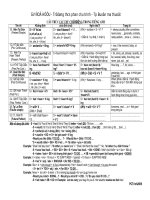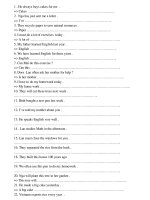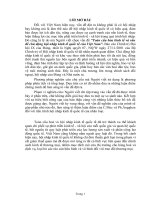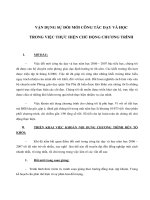chu dong va bi dong
Bạn đang xem bản rút gọn của tài liệu. Xem và tải ngay bản đầy đủ của tài liệu tại đây (154.81 KB, 7 trang )
SUMMARY ON TENSES
TENSES FORMATION USE MARKER
SIMPLE PRESENT
S+V
o
/ V
s/es
- Diễn tả sự thật hiển nhiên, 1 chân
lý.
- Diễn tả thói quen, hành động xảy
ra thường xuyên ở hiện tại.
Often, usually, frequently, always ,
constantly, seldom, rarely, sometimes,
occasionally, everyday/week/month
PRESENT
PROGRESSIVE
S+ am/is/are + V-ing
- Diễn tả HĐ đang diễn ra và kéo
dài 1 thời gian ở hiện tại.
- Xuất hiện sau câu đề nghị, mệnh
lệnh.
- Diễn tả HĐ sắp xảy ra ở tương lai
gần
- Diễn tả sự phàn nàn
Now, right now, at the moment, at
present.
Look!
Be quiet!
SIMPLE PAST S+V
2
ed
- Diễn tả HĐ đã xảy ra trong quá
khứ,
chấm dứt rồi và biết rõ thời gian
- Diễn tả thói quen ở quá khứ
Last, ago, yesterday , in + year(in the
past)
When, as (hđ ngắn)
PAST
PROGRESSIVE
S + was/ were + V-ing
- Diễn tả HĐ đang xảy ra tại 1 thời
điểm quá khứ/ suốt khoảng thời
gian ở quá khứ
- Diễn tả HĐ đang xảy ra ở quá khứ
thì có 1 HĐ khác xen vào cũng ở
quá khứ
- Diễn tả 2 HĐ cùng xảy ra song
song ở quá khứ
At this time, time + yesterday,
last….when, while
SIMPLE FUTURE S + shall/ will + V
0
- Diễn tả HĐ xảy ra ở tuơng lai
Tomorrow, tonight, soon, again, next +
… , in + year (in the future)
- 1 suy nghĩ , giả thuyết về tương lai
FUTURE
CONTINUOUS
S + shall/will + be + V-ing
- Diễn tả HĐ đang xảy ra tại một
thời điểm tương lai/ suốt quảng thời
gian ở tương lai
- HĐ đang diển ra ở tương lai lúc
việc khác xảy đến
At this time + tomorrow
PAST PERFECT
S+ had+ V
3
ed
- Diễn tả HĐ quá khứ xảy ra trước 1
thời điểm ở quá khứ hoặc trước 1
HĐ quá khứ khác.
Before , after, when, as, as soon as,…
Up to then
PRESENT PERFECT
S+ have/has + V
3
ed
- Diễn tả HĐ vừa mới xảy ra, HĐ
được lặp đi lặp lại nhiều lần ở quá
khứ.
- Diễn tả HĐ bắt đầu từ quá khứ
mà còn kéo dài đến hiện tại và có
khả năng tiếp tục ở tương lai.
- Diễn tả HĐ xảy ra trong quá khứ
mà không biết rõ thời gian.
Just,ever,
never,
already,
yet,since,for,
sofar=until now =
=uptonow = up to the present
Before it’s the first time
PRESENT PERFECT
CONTINUOUS
S+ have/has + been + V
ing
- Diễn tả HĐ bắt đầu trong quá khứ
và kéo dài liên tục đến hiện tại
(người nói chú ý đến sự việc xảy ra
hay thời gian xảy ra)
Since , for
All day…
NEAR FUTURE S + be going to + V
0
-
TENSES & TENSE TRANSFORMATION
1.
S + began/ started + V-ing/ To V …… in+time/ time+ago
S + have/has + Ved/3…………… since/ for + time
have/ has + been + V-ing…….
Ex: I started learning English five years ago
I have been studying English for five years
2.
S + have/ has + (not) + Ved/3…… for + time
It’s + time + since + S + (last) + Ved/2
Ex: I haven’t seen him for two months
It’s two months since I last saw him
3.
S + have/ has + not + Ved/3………for/ since + time
a. The last time + S + Ved/2……was + time + ago
in + time
b. S + last + Ved/2 …… time + ago
in + time
Ex: I haven’t seen him for two moths
The last time I saw him was two months ago
I last saw him two months ago
4.
S + have/ has + not + Ved/3………before
It/this/that is the first time + S + have/ has + Ved/3
Ex: I haven’t seen that man here before
It is the first time I have seen that man here
5.
How long is it since + S + Ved/2… ?
have/ has + S + Ved/3… ?
When did + S + V
0
…….?
Ex: How long is it since you sold this car?
When did you sell this car?
6.
S + have/ has + never + Ved/3 + such (a/ an) + Adj + N
It/this/that is the + Adj (superlative) + S + have/ has + ever + Ved/3
Ex: I’ve never met such an intelligent boy
This is the most intelligent boy I’ve ever met
7.
Before + S + Ved/2………….S + had + Ved/3
After + S + had + Ved/3……….S + Ved/2
Ex: He played football but first he did all his homework
Before he played football, he had done his homework
After he had done his homework, he played football
8.
S + have/ has + (not) + Ved/3 ….+ since + S + Ved/2
S + (last) Ved/2 + when + S + Ved/2
Ex: John hasn’t seen her since she left for Japan
John last saw her when she left for Japan
9.
S + had + hardly + Ved/3 + when + S + Ved/2
= Hardly + had + S + Ved/3 + when + S + Ved/2
S + had + no sooner + Ved/3 + than + S + Ved/2
= No sooner + had + S + Ved/3 + than + S + Ved/2
Ex: He had hardly seen me when he ran away
He had no sooner seen me than he ran away
PASSIVE VOICE
Active: S + V + O
Passive: S + BE + V
3/ ED
+ by O
I. Tense forms of Passive Verb : ( Các dạng thì của những động từ thể thụ động )
1.Passive form of The present tense
( Dạng bò động của thì hiện tại đơn)
S + Am / Is / Are + V
3
Active
Ex : The news surprises me.
Ex : The news surprises Sam.
Passive
Ex : I am surprised by the news.
Ex : Sam is surprised by the news.
2. Passive form of The past tense ( Dạng bò động
của thì quá khứ đơn)
S + Was / Were + V
3
Active
Ex : They bought this house last year.
Ex : I saw them yesterday.
Passive
Ex This house was bought last year.
Ex : They were seen yesterday.
3. Passive form of The past progressive tense
( Dạng bò động của thì qk tiếp diễn)
S + Was / Were + Being + V
3
Ex : Mai was cooking dinner at 6 p.m yesterday.
Ex : She was talking to them when I came.
Ex : Dinner was being cooked by Mai at 6 p.m
yesterday.
Ex : They were being talked to when I came.
4. Passive form of The present progressive tense
( Dạng bò động của thì ht tiếp diễn )
S + Am / Is / Are + being + V
3
Ex : The secretary is copying some letters now.
Ex : Someone is building a new hospital.
Ex : Some letters are being copied by the secretary now.
Ex : A new hospital is being built.
5. Passive form of The present Perfect tense
(Dạng bò động của thì hiện tại ht )
S + Has / Have + Been + V
3
Ex : I have just bought a car.
Ex : Phong has done these excercises for 3 hours.
Ex : A car has just been bought.
Ex : These exercises have been done for 3 hours by
Phong.
6. Passive form of The past Perfect
(Dạng bò động của thì quá khứ ht )
S + Had + Been + V
3
Ex : They had phoned me before they left. Ex : I had been phoned before they left.
7. Passive form of The Future tense
(Dạng bò động của thì tương lai đơn)
S + Will + Be + V
3
Ex: Mai will visit Cuc Phuong national park next week. Ex : Cuc Phuong national park will be visited by Mai
next week.
8. Passive form of The Future continuous tense
(Dạng bò động của thì tương lai td )
S + Will + Be + Being + V
3
Ex : They will be writing the lesson at 8 a.m tomorrow. Ex : The lesson will be being written at 8 a.m
tomorrow.
9. Passive form of The Future perfect tense
(Dạng bò động của thì tương lai ht )
S + Will + Have + Been + V
3
Ex : We will have finished our work by the end of this
month.
Ex : Our work will have been finished by the end of this
month.
10. Passive form of The Future perfect continuous
tense
(Dạng bò động của thì tương lai httd)
S +Will + Have Been + Being+V
3
Ex : They will have been teaching English at this school
by then.
Ex : English will have been being taught at this school
by then.
11. Passive form of The present and past perfect
continuous tense
(Dạng bò động của thì hiện tại hoàn thành & quá khứ
hoàn thành td )
S+Have/Has + Been + Being + V
3
S + Had Been + Being + V
3
Ex : They have been learning French for ten years.
Ex : We had been eating lunch before they called.
Ex : French has been being learned for ten years.
Ex : Lunch had been being eaten before they came.
II. PASSIVE MODAL AUXILIARIES ( Dạng bò động của trợ động từ hình thái hay khiếm khuyết )
Form : Modal + Be + pastparticiple Active Modal Auxiliaries Passive Modal Auxiliaries
Can
Could
May
Might
Have to
S + Has to + Be+ V
3
Ought to
Should
Must
Used to
Be going to
Ex : I can do these exercises .
Ex : You have to clean the floor.
Ex :Ted should mail it.
Ex : They are going to build this bridge.
Ex : These exercises can be done.
Ex : The floor has to be cleaned.
Ex : It should be mailed.
Ex : This bridge is going to be built .
III / SOME OTHER CASES ( Một số trường hợp khác )
1. Verb of opinion : say, think, believe, report, hope, explain ………
A. S + V + That + Clause <=> It + Be + V
3
+ That + Clause
Ex : They think that he is a good teacher.
=> It is thought that he is a good teacher.
Ex : People say that we will pass this exam.
=> It is said that we will pass this exam.
B. S + V + That + Clause ( S
2
+ V
2
+ O
2
) <=> S
2
+ Be + V
3
+To infinitive or perfect infinitive
Ex : People said that he had gone abroad.
=> It was said that he had gone abroad. Or He was said to have gone abroad.
Ex : They believe that he is a good singer.
=> It is believed that he is a good singer. Or He is believed to be a good singer.
2. S + V + Direct Object + To + V
(inf.)
<=> Direct Object + Be + V
3
+ To + V
(inf.)
( advise, ask , force ,
encourage , invite , tell , allow , convince , warn ………… )
Ex : He asked Tom to sit by me. <=> Tom was asked to sit by me.
Ex : She told him not to look for a job. <=> He was told not to look for a job.
3. WH – WORD + [ WILL/ DOES / DO/ DID ] + S + V + O ? <=> WH – WORD + BE + S + V
3
?
Ex : Why did you explain it ? <=> Why was it explained ?
Ex : Where will you do these exercises tomorrow ? <=> When will these exercises be done tomorrow ?
4. YES – NO QUESTION : DO / DOES / DID + S + V + O ? <=> IS / ARE / WAS / WERE + S + V
3
?
Ex : Do you solve this problem ? <=> Is this problem solved ?
Ex : Did your mother make some cakes ? <=> Were some cakes made by your mother ?
5. IMPERATIVE SENTENCE : V + O + ADVER B <=> LET + O + BE + V
3
+ ADVERB
Ex : Write your name here. <=> Let your name be written here .
Ex : Open your book now. <=> Let your book be opened now.
![Ph]ơng pháp rèn luyện câu chủ động sang câu bị động](https://media.store123doc.com/images/document/13/ly/kf/medium_kfs1373449372.jpg)








